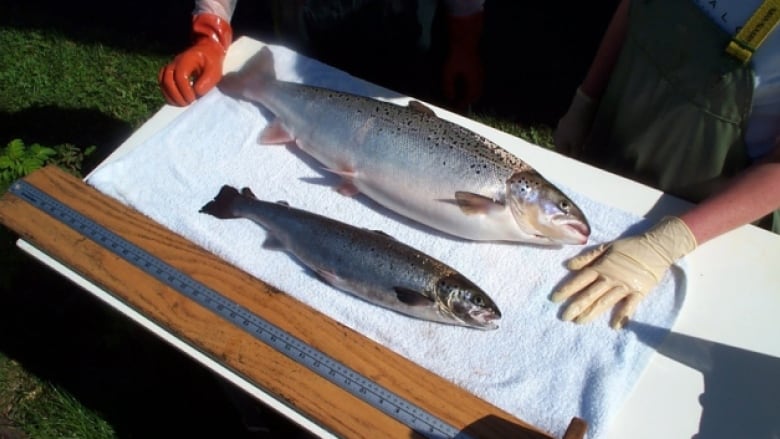AquaBounty considers labelling genetically modified salmon
U.S.-based company about to start commercial production of genetically modified salmon in P.E.I.

The U.S.-based company that's about to start the commercial production of genetically modified salmon in P.E.I.says it's considering labelling the product as such.
However, it's not clear what exactlyAquaBounty Technologiesintends to tell consumers aboutthe fish, whichare modified with a growth hormone gene to make them grow faster.
"We are considering our labelling options and working with potential customers to determine the appropriate approach," a spokesperson for AquaBounty said in a statement sent to CBC News.
The genetically modified salmon, produced in indoor tanks in Rollo Bay, P.E.I., will become the first genetically engineered food animal made in Canada to be sold in Canadian grocery stores.
Environment Canada and Health Canada have given their approval, but it's up to the latter to determine whether products require labelling.
"Health Canada requires labelling for food products where clear, scientifically established health risks or significant nutritional changes have been identified that can be mitigated through labelling," said spokesperson Maryse Durette.
'Safe and nutritious,' Health Canadasays
After a four-year study, the federal agency has determined the genetically modified salmon to be "safe and nutritious" and thereforeno labelling is required.
AquaBounty's most recent statement on labelling is news to SylvainCharlebois, aDalhousie Universityprofessor in food distribution and policy.
"I did encourage AquaBounty to reconsider its policy around transparency and risk communication," he said Sunday on CBC Radio's Maritime Connection.
"It is a pleasant surprise to me because I do think that the industry is starting to realize how important it is to connect with the public more so than ever before to get that social licence."
AquaBounty Technologies is planning to grow 250 tonnes of its AquAdvantage salmon in Rollo Bay. The fish will be on the market in late 2020.
The company's AquAdvantage salmon grow faster than regularsalmon. A growth hormone gene fromChinook salmon and proteins from ocean pout, a type of eel, are spliced into the genes of an Atlantic salmon.
Remaining questions about labelling
Lucy Sharratt, of the Canadian Biotechnology Action Network, saidshe doesn't expect AquaBounty to follow through on any clear labelling.
"If you leave the labelling to industry rather than mandatory government standard then who knows what you will see and the potential is greater confusion."
Mark Butler, of Halifax's Ecology Action Centre, has long opposed the genetically engineered salmon and said he believes AquaBounty has no intention of putting any clear marking on any fish-food product that contains genetically modified salmon.
He notedAquaBountyhas been selling genetically modified salmonin Canada since it was approved by Health Canada in May 2016. That salmon is made in Panama using Canadian eggs. The company has said little about where it's being sold, onlythat a Canadian buyer uses the fish in their lines of high-end sashimi.
"I haven't followed closely their statements on labelling," Butlersaid. "I have followed their actions and they sold and perhaps are still selling GM salmon to Canadians with absolutely no labelling. It's still a pretty loose statement."












_(720p).jpg)


 OFFICIAL HD MUSIC VIDEO.jpg)
.jpg)



























































































